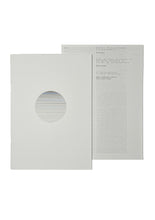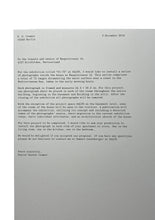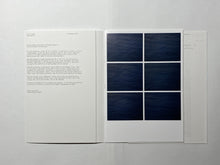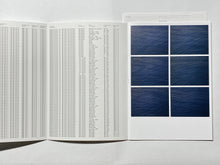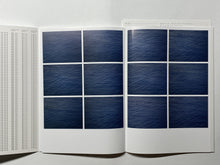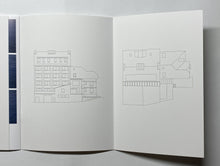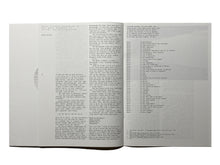Daniel Gustav Cramer: 01-72
Daniel Gustav Cramer
Regular price
$28.00
Sale
This two-part publication has been released in March 2014 on the occasion of the exhibition “01-72″ by Daniel Gustav Cramer at SALTS, Basel. It consists of an artist’s book, giving more insight into the project and a reader with texts from Quinn Latimer, Kirsty Bell and an interview with the artist.
Daniel Gustav Cramer works in a multitude of media such as photography, sculpture, book-making and text-work, which often, when united in a show, assume a conceptual meta-structure which points towards narration and well beyond. It attempts to expose the many layers and various possible perspectives one can opt for when looking at an object. These layers have the possibility to link-up, to create possible lines that connect to each other's cross-path in a non-linear story. Cramer is interested in the different facets of this experience, of how these motions shift and change when they gravitate towards one another.
In his most expansive project to date, Daniel Gustav Cramer let's us glimpse into the vast experience a work can offer, from the things that happen at the the fringe of the work itself, that which surrounds it, what it entails preparing for it and what reach it can have beyond its presentation form. Cramer offers the audience to feel the halo that hovers above a certain moment, the thing that gives the work the richness, the fullness, that which strengthens the work from within. Firstly, Cramer turns not only the site of the exhibition into one enormous sculptural object but his conceptual approach to the very impetus of the idea is of sculptural nature itself. Secondly, his subject, here a series of water photographs become the vessel to experience the entire social-cultural context these images might be imbedded in, from inception to execution, the audience is involved.
For 01–72, Daniel Gustav Cramer composed a formal letter which enquires about the possibility of installing a group of his photographs in each room of each apartment in a building of his choosing, here the site of his current exhibition, where SALTS is located in. The concept is to install 72 photographs, each depicting a fragment of seawater, taken from roughly 30 meters above sea-level somewhere in the Mediterranean Sea. The lens is looking down onto the open water, each water portrait appears like the previous one, but each differs in nuances, since all 72 images are taken in chronological order, in about a span of 18 minutes. Now here, the frames will occupy every room, every hallway, the attic area as well as the boiler room of this housing complex full of residential flats and store fronts. All images are framed in thin white frame and hung in a sort of gradient progression, which follows the rising of the sun, while they hang starting in the basement and follow-through up to the attic. Each portrait touches the wall of an adjacent one, thus suggesting the element of water to flow throughout the entire building. The result of this pictorial sea progression, spreading through a vertically raised architectural space, makes this a collective experience for all the inhabitants of the house.
The artist has an interest in the abstract nature of the water, its biomass and neutrality in which it just is. For the people in the house, who are all invited to live with these images for the duration of the exhibition they hold a different potential; they are all aware that their neighbors have a similar experience, they all share the notion, that above them, below them, next to them is such an image, which was taken just moments before the one they are looking at the moment. They are organically connected through an invisible thread, an image that suggests, a distance, a remoteness, the open sea, liquidity with all its massive physicalness but which here is contained within their own personal space. The repetitiveness of this image creates a certain sense of calm among the diverse environments it is hung in.
Rather than portraying a protagonist, he takes pleasure in capturing the temporal shift which occurs between watching someone or something, recording it and then contextualizing it through the language of an exhibition. Cramer creates lines, lines between his camera and the water, between a point in the Mediterranean Sea and Birsfelden, between writing a letter and the people receiving it. They in turn create a line between the neighbors themselves, between all the images hung and finally between the “object” in its entirety and the public who is visiting the exhibition.
Cramer has managed through a simple but reoccurring gesture to unite, reduce and minimize the experience of “experiencing” an artwork. In this exhibition, exposure is turned inside out and makes the site of presentation not just a platform, but one object, one experience, one sculpture. In this exhibition with the title 01–72, narrative is deconstructed and unthinkable without the space it inhabits. A letter is placed in the garage explaining the idea to the people living in the house, just next to it, on the outside wall of the garage, an extensive list documents the scope of the project, and the path these images have been taking. Inside the exhibition space one discovers the first, the 01 of the seventy-two photographs which was taken at 6.23am of and which unfolds the story and what can partly be followed. It describes what is here but also what can not be seen in the floors above, it forms a sentence without letting the viewer hear the finish of it. The sparse exhibition room leaves way for comfort or discomfortable since the viewer has to decide how or if they want to read the story that is unfolding in front of them. Fact is, Daniel Gustav Cramer consciously withdraws from the centerpiece in order to focus on the core. Daniel Gustav Cramer was born in 1975 in Düsseldorf. He lives and works in Berlin but only very rarely.
Co-published by &: christophe daviet-thery with Samuel Leuenberger, SALTS
Designed by Ronnie Fuglister and Daniel Gustav-Cramer
Text by Kirsty Bell and Quinn Latimer
Edition of 1000 copies, 2014








